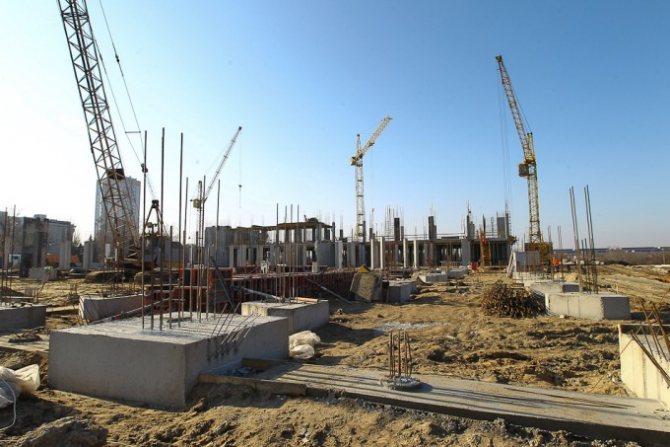Grounds for collecting penalties
The basis for applying penalties to the developer is the delay in delivery of the house during shared-equity construction. This fact is confirmed quite simply:
- when signing the DDU, a date will be agreed upon no later than which shareholders must receive housing under the deed;
- the parties can change the specified period only by mutual additional agreement;
- Even if there is a delay of one day, the right to collect a penalty from the developer will arise.
The developer must take into account all his risks in advance and indicate in the DDU the actual date of commissioning of the house. It will be impossible to change this condition of the contract without the consent of other parties to the transaction, i.e. shareholders. This rule does not apply to detached non-residential premises, even if it is part of an apartment building complex.
A penalty for late delivery of an object can be recovered for the entire period of non-fulfillment of obligations. Until a transfer and acceptance certificate is signed between the construction company and the shareholder, penalties will be charged in the amount specified in Art. 6 Law No. 214-FZ.
For DDU, there are two rules for determining the amount of the penalty. If the buyer of the property is an organization or individual entrepreneur, the fine will be 1/300 of the refinancing rate of the Central Bank of the Russian Federation. However, to protect ordinary citizens, the law provides for increased penalties. For late delivery of an apartment under a shared participation agreement, if its participant was an individual, the penalty is paid in double amount, i.e. 1/150 of the rate of the Central Bank of the Russian Federation.
The law also indicates that the penalty rate under the contract cannot be lower than the legal amount. This means that the developer has the right to provide for a higher value of penalties in the DDU. In practice, this is rarely used, so the legal amount of the penalty will apply. An additional sanction for the developer may be a fine of 50% of the amount of the penalty if he violates the deadline for consideration of the claim. The procedure for collecting such compensation is provided for by the Law “On Protection of Consumer Rights”.
Do not mix compensation and penalties
Shared construction is still a rather risky area. The period of project implementation is not months, but years of waiting, during which many different events can happen: a delay in the construction of the project, freezing of construction, the developer may have financial problems that will end in bankruptcy.
Meanwhile, the law does not provide for a uniform form of the document. Each developer develops his own contract and is free to include in it any clauses that do not contradict the law. In almost every agreement there are many pitfalls, veiled wording and unfavorable conditions for equity holders, in particular regarding the timing of delivery of the house.
By law, the developer is obliged to transfer the housing to the shareholder in a timely manner in accordance with the period specified in the contract. Federal Law 214 provides for the developer's liability for late delivery of a house. Failure to comply with construction deadlines and failure to comply with the delivery time of the project threatens builders with hefty fines.
However, who wants to pay out of pocket for missing deadlines? And developers, or rather the company’s in-house lawyers, are beginning to invent conditions that allow them, if not to avoid liability, then at least to delay its onset.
The contract does not include the exact date of transfer of the object, but an approximate one, for example, the fourth quarter of 2021, or “three months after the state commission accepts the house.” This does not directly contradict the law, but it is very unprofitable for the shareholder. In the first case, the deadline after which the penalty can be collected will be December 31, 2018.
In this regard, lawyers advise: before signing a document, be sure to show it to a professional who can detect hidden conditions that infringe on the rights of shareholders.
Federal law is primarily aimed at protecting the weaker side, which are ordinary citizens. Therefore, the developer’s fines under Federal Law 214 are quite impressive. With competent and consistent actions for a long wait for his apartment, the shareholder can receive a considerable amount of compensation from the construction company.
For violation of the deadline for transferring an object from
the developer is charged a penalty
(1/150 of the Central Bank rate of the full price of the DDU for one forecast day). If the delay entailed additional expenses, for example, a citizen was forced to rent another apartment during this time, then these losses of the shareholder must also be compensated. In case of a judicial settlement of the issue, the developer can also be charged moral compensation, a fine of 50% of the total amount of the claims stated in the claim, legal services and legal costs.
The actions of the shareholder depend on how much the developer delayed the transfer of the property. There are several options for the development of events. Let's consider each of them separately.
The developer is obliged to notify the participants one month before the deadline that it is ready to transfer the housing. If for some reason the construction period is delayed, he must inform the shareholder in advance (60 days before the day of transfer) and invite him to sign an agreement to extend the period. Whether or not to agree to sign this document is up to each citizen; the law does not oblige him to do so.
Lawyers do not recommend that citizens sign an agreement with the developer, sent by the latter after the deadline for handing over the house established in the contract has passed. In this case, the shareholder will not win anything, but may lose the statutory penalty and compensation.
If the shareholder does not agree to renew the contract, or has not received any communication from the developer with a proposal to enter into an agreement, we recommend that you adhere to the following procedure:
- Send a claim to the construction company, demanding payment of a penalty and covering your expenses.
- If the result is negative, sue the developer.
In both cases, you must independently calculate the penalty.
If more than two months have passed since the date in the contract when the developer was supposed to transfer the housing to the participant, the shareholder can initiate the procedure for terminating the DDU. To do this, it is enough to simply send a notice to the construction company that the project participant refuses to further fulfill the terms of the contract.
In this case, the developer must not only return all his funds to the citizen, but also pay interest on the use of other people’s money (1/150 of the Central Bank rate for one day). Moreover, the penalty is calculated for the entire term of the contract. The DDU is considered canceled from the moment the notification is sent.
The shareholder must ensure that the sending of the letter is documented. All the details of this procedure can be found in the article “How to correctly draw up and send to the developer a notice of unilateral termination of the contract.” The law allows the developer twenty weekdays from the moment the letter was sent to settle the settlement with the shareholder.
N = ((Tsk x KS x 0.01)/K) x D;
- where N is the amount of the penalty, rub;
- Tsk - the price of the object (apartment) determined by the DDU, rub;
- KS - key rate of the Bank of Russia, %: 0.01 - coefficient for converting interest into fractions of units;
- K is a coefficient indicating the share of the penalty from the product of the cost of the apartment by the refinancing rate.
We invite you to read: Transfer of a non-residential building to an apartment building
For stateless persons and with a residence permit it is 300, for citizens of the Russian Federation – 150.
D — duration of delay, days.
The delivery of the house and the transfer of an apartment worth 5 million rubles to the shareholder, a citizen of the Russian Federation, is 15 days overdue. The key rate was constant throughout this time and amounted to 7.75%. Thus, the payment of the penalty (compensation) for this period will be: N = (5,000,000 x 7.75 x 0.01) /150) x 15 = 38,750 rubles.

The entire penalty is charged to the account or plastic card of the escrow agent (authorized bank) provided by the equity holder.
If the developer delays the delivery of the house, the first thing you need to do to receive a penalty is to competently and correctly fill out and send a claim to him. It is formatted as follows:
- In the upper right corner all passport details of the applicant shareholder and the full name of the developer are indicated;
- Next he writes the title of the document;
- After the title it is indicated, as in the contract, when and between whom it was concluded, its subject (apartment, its area, location), the cost of the contract;
- The following describes the fact that the developer violated the deadline for transferring the shared construction project - it indicates when the apartment was supposed to be delivered;
- An excerpt of the methodology for calculating penalties from Law No. 214-FZ is given;
- The calculation of the amount of the penalty as of the date of filing the claim and the requirement to pay it within the time specified in the contract (the period for resolving claim disputes) are provided;
- The claim also contains a demand for the transfer of a shared construction project - an apartment, indicating its characteristics and location;
- At the very end of the claim, the shareholder puts his signature and indicates the details for paying the penalty. It is best to make such a claim not in handwriting, but using a computer.
The claim is drawn up in 2 identical copies: both of them are registered and signed by the legal entity of the developer specified in the DDU, after which one of them is returned to the shareholder.
Important! A letter of claim signed and registered with the developer is required. If the developer has only 1 copy of this document, it can be destroyed along with a record of its registration in the appropriate journal. Thus, the problem of late delivery of houses and apartments during shared-equity construction is an unpleasant situation, but quite easily solvable.
Noticed a mistake? Select it and press Ctrl Enter to let us know.
I advise you not to confuse two claims - about compensation for renting an apartment during the delay in transfer and about penalties for the violation of the transfer deadlines itself.
If I were the developer, I would try, on the contrary, to indicate in the agreement that the shareholder has no other claims. Do not agree to this wording: when you receive the keys, file another claim - this time for payment of a penalty for late delivery. We wrote about it in the article “Take an apartment in a new building. Step 1: papers."
The developer will probably object to you: “You already receive compensation for rent! If you want a penalty, refuse the hiring compensation.” To parry in negotiations, learn this phrase:
- According to Article 10 of Law 214-FZ, as well as paragraph 60 of the Resolution of the Plenum of the Supreme Court of the Russian Federation dated March 24, 2016 No. 7 “On the application by courts of certain provisions of the Civil Code of the Russian Federation on liability for violation of obligations,” damages in the form of rental costs are recovered in the full amount in excess penalties, since the penalty is of a punitive nature.
Then maintain a theatrical pause while the developer’s lawyer blushes with shame and quietly foams.
If the developer is a bandit
If the director is a seasoned bandit, at the meeting he will make it clear that he is not ready to meet you halfway, and if you make any additional efforts, your fingers will be broken or your family will be harmed.
Usually bandits in this area will mention connections in the Ministry of Internal Affairs and the courts: they say that any case against them will be hushed up and lost. You always have in your arsenal higher courts, the prosecutor's office and publicity in the media. Local bandits seem invulnerable to themselves, but they are afraid of unnecessary publicity and checks from Moscow.
Then you have two options: retreat or fight. Formally, the truth is on your side, but you need to evaluate the costs of protecting your rights and the rights of your family. At this stage, you should definitely have an experienced lawyer.
In the margins, we note that bandits rarely manage exemplary development companies that care about the quality of objects.
The fight against organized crime in Russia is the responsibility of the Ministry of Internal Affairs; The head of the Ministry of Internal Affairs is appointed by the president on the advice of the prime minister. Participate in elections to influence the crime rate in your area.
See also: Varlamov was attacked in Stavropol, he is sure that it is a developer, but the prosecutor’s office said no. According to unverified data, Varlamov is alive and well.
- If the delay is due to reasons that the developer can eliminate in a short time (for example, the supplier delayed the delivery of building materials, etc.), then the contract is not terminated. It is better not to panic and wait until construction is completed, especially if the construction company has a good reputation. It’s also not scary when the construction of the house is almost completed, only some finishing work remains.
- If the delay is caused by serious reasons, for example, lack of construction documentation, change of developer, then you can think about terminating the contract. Another reason to think about terminating the contract is a delay for a very long period.
- We are making a claim. You can use the sample claim posted on this site below.
- We send the claim to the developer by registered mail with notification so that we have proof of dispatch. The letter is sent to the legal address of the developer.
- We are waiting for the developer’s response, or wait 30 days if the developer has not responded.
- We go to court with a statement of claim to collect a penalty from the developer.
- Jurisdiction for cases of collection of penalties under an agreement of shared participation in construction is alternative. You can go to court either at the location of the construction organization or at your place of residence.
- A sample statement of claim can be found on many websites, in legal systems, you can use our sample. Be sure to indicate the full name, address of the plaintiff, details of the developer, formulate your requirements, date and sign.
- We pay the state duty (the state duty calculator is available on the court websites). Attention! According to the law on the Protection of Consumer Rights, claims of a shareholder up to 1 million rubles are not subject to state duty. If the claims exceed 1 million rubles, the part that exceeds this amount is subject to state duty in accordance with the general procedure.
- You have the right to demand recovery of moral damages caused by the delay. Moral damage is not included in the cost of the claim.
- If the developer does not pay the penalty voluntarily, then the provisions of the Consumer Protection Law apply. The court collects a fine from the developer in the amount of 50% of the penalty amount.
- The court may reduce the amount of the penalty, guided by Art. 333 Civil Code of the Russian Federation.
- The shareholder may recover the costs of the representative's services by submitting a written application.
- We attach to the statement of claim a receipt for payment of the state duty, evidence documents (agreement, receipt of payment under the agreement, claim to the developer, etc.), a copy of the claim for the defendant (all documents in the amount according to the number of persons participating in the case and for the court).
- We submit the statement of claim with attachments in person to the court office, put a mark of receipt on our sample, or send it by registered mail with an inventory.
- After acceptance, the court will accept the claim for proceedings within 5 working days. A court ruling will be sent to the plaintiff's address, which contains information about the date and time of the court hearing and a court summons. If no information has been received from the court, then you need to contact the civil office and independently find out the appointment date.
- After the court makes a decision, you need to obtain a writ of execution and submit it to the bailiff service.
Calculation of the amount of the penalty
To correctly calculate the amount of penalties, you need to know the period of delay. This could be a length of time:
- between the date of delivery of housing specified in the contract and the moment of signing the act;
- period of delay as of the date of filing the statement of claim in court.
If the violation of obligations continues after filing the claim, during the process it is possible to recalculate upward. It is also possible to re-file a statement of claim if, after the decision was made, the shareholder still did not receive the apartment. The second court will consider the new period of delay according to similar rules.
Calculation example
The shareholder is required to calculate the penalty under the DDU when preparing a claim or statement of claim. The formula used for this is:
Sn = Kdn x Sdog x 1/150 of the refinancing rate, where:
- Sн – amount of penalty to be collected;
- Kdn – number of days of delay, i.e. before the date of actual acceptance of the apartment or filing of a claim;
- Sdog – the amount under the contract.
The refinancing rate indicator is periodically changed by the Central Bank. You can always check the current indicator on the website of the Central Bank of the Russian Federation. You can calculate the number of days of violation of obligations using the calendar.
Make a claim
If the developer delays the delivery of the house, each shareholder decides for himself what to do with the additional agreement proposed to him to extend the deadline for delivery of the shared construction project - no one can force him to make a decision for or against signing this document. As a rule, in such a situation, the shareholder signs this document if he has the opportunity to wait, has enough funds for rented housing, the shareholder enters into the position of a developer and does not escalate the situation.
However, very often the exact opposite situation arises, more typical for married couples with children - a family that has been planning a move for several months and no longer has the opportunity to rent housing can refuse this option and terminate the contract with the ensuing consequences (they will be discussed below).
Refusal to sign this additional agreement means the shareholder’s disagreement with the new deadlines for delivery of the house proposed to him, the developer.
In this case, there are 3 possible ways for the situation to develop in the future:
- The shareholder does not terminate the agreement with the developer and receives a penalty for late delivery of the house;
- The shareholder terminates the contract, as a result of which the developer returns to him all the money paid for the construction of the apartment;
- The developer refuses to terminate the contract, after which the shareholder goes to court, and having won it, receives not only all the funds paid to him, but also compensation for moral damage caused, reimbursement of all legal costs (state fees, money spent by the plaintiff on hiring a lawyer and consulting with a paid lawyer ).
Usually, when refusing to sign an additional agreement, equity holders prefer the first option - if they have rented housing, the delay allows them to almost completely recoup the costs of paying for it, and if the cost of the apartment under construction is high, such a penalty will also leave extra money that did not go into circulation.
The claim must contain information about the shareholder and the developer, a reference to the contract, calculation of the penalty and a clearly formulated requirement to pay the penalty in a certain amount.
In addition to the requirement to pay a penalty, you can ask to transfer the apartment and compensate for losses. For example, while the apartment was not rented out, you lived in a rented apartment. You may be able to claim back rent for the period of delay if you can prove the costs with receipts, a lease agreement, or other documents.
Sample (form, template) of a claim at the link.
If the developer’s office is in another city, send him two letters: a valuable one with a description of the attachment and a receipt, and a registered one. What is valuable is your safety net. It will arrive at the post office and, if anything happens, it will prove that you did not send the developer a postcard for Builder’s Day, but actually a claim.
Which court to file a claim in?
If the shareholder under the DDU is a citizen, and the amount of the penalty does not exceed 50 thousand rubles, the claim must be filed with the magistrate. If the cost of the claim is greater, the documents will be considered by a court of general jurisdiction. In case of bankruptcy of the developer, claims must be presented in the framework of an arbitration case.
As a general rule, jurisdiction for a dispute is determined by the location of the defendant or the property. Since we are talking about collecting a penalty under the DDU, a special rule is applied to protect consumer rights - the plaintiff can choose where to file a claim. It is allowed to go to court at the location of the defendant, or at the citizen’s residential address. To correctly determine jurisdiction, we recommend consulting with our lawyer.
What to do if the delivery of your house is delayed
According to the law, if the developer sees that it is not possible to deliver the object within the allotted time, he must send a proposal to the participants to extend the deadline sixty days before the deadline. If the shareholder does not object, the parties sign an agreement between themselves. But it should be taken into account that by agreeing to the developer’s conditions, the shareholder deprives himself of the opportunity to receive a penalty from the violator.
The main document that serves as evidence of violation of delivery deadlines, and on the basis of which the amount of the penalty is calculated, is the transfer deed. If the document is not signed and the deadline specified in the contract has already passed, it confirms that the shareholder has not yet received the apartment. If the housing has already been transferred to the participant, but the date on the deed is later than in the DDU, this indicates that the object was delivered late.
If the developer is late in delivering the apartment, and the shareholder does not want to put up with this, he can initiate the process of collecting a penalty from the developer. The first step in this direction is to send a detailed claim to the construction company. The pre-trial procedure is not mandatory by law; you can skip it and immediately send the application to the court. However, if such a procedure for resolving a dispute is provided for by the terms of the DDU, then it must be observed.
You can find out in more detail what a shareholder should do if the construction company is in no hurry to hand over the house in the article.
If the shareholder is dissatisfied with the fact that the developer did not deliver the apartment under the shared participation agreement on time, and is not satisfied with the proposal to postpone the delivery of the residential property, then there are 2 ways out of the situation:
- Resolving the problem without judicial intervention;
- Judicial settlement of the problem.
In order to solve the problem of overdue apartments under the DDU peacefully, the shareholder needs to file a claim against the developer indicating one of the following requirements:
- Return of funds that were invested in shared construction in connection with the termination of the shared-equity building;
- Payment of monetary compensation for violation of the conditions of renting an apartment;
- Carrying out any additional work that was not prescribed in the conditions of the preschool education;
- Voluntary payments of penalties or penalties to the shareholder, which resulted from a violation of the contract.
The claim can be sent by registered mail with acknowledgment of receipt, or the shareholder can deliver it to the developer personally. This document must be reviewed by the developer within 20 days of receipt. If there is no response, the shareholder has the right to appeal to the judicial authorities.
The statement of claim is filed with the district court at the location of the development company. The following package of documentation will need to be attached to the completed claim:
- A photocopy of the DDU;
- Additional agreements, if they were concluded;
- Documents confirming payment under the DDU;
- A copy of the completed claim;
- Receipt for payment of state duty.
We invite you to read: How to bypass customs clearance of a car - in 2019, for a citizen, with mileage, price
If the court establishes the fact that the developer did not rent out the apartment under the shared participation agreement on time, then the decision will be made in favor of the shareholder, which means that all his demands will be satisfied.
How to get a court decision
If the issue of collecting a penalty is decided positively by the court, the developer has the right to appeal the decision within 30 days. If the complaint is not filed, after the expiration of the specified period you need to contact the court office and pick up the decision and writ of execution. If the developer has filed for review, the appeal determination of the shortcomings of the first instance act will take up to 1 month. As soon as the complaint is considered, the court's decision will come into force. You can obtain it from the court office of the first instance, where the case will be returned.
What to do if construction defects are discovered
Acceptance of an apartment should be approached with special care and responsibility. There is no need to rush to get the keys as soon as possible and sign the acceptance certificate without looking. It is this document that confirms that the owner agrees with everything he receives. If the apartment is handed over with defects, then after signing the deed, it will be problematic to demand compensation or elimination of defects.
When inspecting an apartment, the owner should carefully check the equipment for correct operation, inspect all seams and joints of the slabs, check for unevenness and cracks in the walls, ceilings or floors. Often, during an inspection, a representative of the developer company issues a standard inspection sheet (defective sheet), which serves as an attachment to the acceptance certificate. It is in this form that defects must be entered if any are discovered during the inspection of the apartment. If there is no defective sheet, you can draw it up on a regular sheet of paper by hand.
After the defective act is drawn up in 2 copies, one is given to the developer, and the owner keeps the second with a signature from the developer’s company. If the company does not want to accept the act, then it is sent by letter with notification, and also supported by a claim. The complaint must indicate not only a list of defects, but also the time frame within which the errors must be eliminated.
Arbitrage practice
Although the amount of the penalty and the procedure for its collection are specified in detail in the law, problems may arise in the legal process. It will be most difficult to obtain compensation if the developer has filed for bankruptcy. In this case, the property of the construction company will be sold at auction, so the time of payment may be delayed.
Disputes regarding the collection of penalties under the DDU have repeatedly been the subject of proceedings by the Supreme Court of the Russian Federation. The following recommendations of the Supreme Court can be identified, which will be applied when considering the claim:
- the penalty under the DDU does not apply to cases of construction of apartments, since this object does not fall under the concept of residential premises under the Housing Code of the Russian Federation;
- the contract amount on which penalties are charged includes both the shareholder’s own investments and mortgages, maternity capital, and other sources of financing;
- recovery is allowed even in the case of. if the DDU was concluded without prepayment on the part of the shareholder;
- a claim for a penalty can be filed not only by a Russian, but also by a foreign citizen or a stateless person.
Filing a claim against the developer
A claim is a legal document that may later be presented in court. It should be written in strict business language. There is no single form for this document, so it can be written in any form.
The claim must contain:
- Information about the agreement (number, date of conclusion);
- Description of the delivered or not yet delivered object (number, area, floor);
- Clauses of the contract that the developer violated;
- Links to the articles of law under which the violation falls;
- The amount of the penalty calculated as of the date of filing the claim;
- The requirement to pay a penalty and the period given by the shareholder for its fulfillment. As a general rule, it is ten days.
If the shareholder has incurred additional expenses due to the delay in delivery of the house, the amount of losses and the claim for their compensation can also be included in the claim. Losses can include payment of rented housing for the period of delay, overpayment of interest on a mortgage loan.

The letter of claim is sent to the construction company by registered mail with an inventory and notification of receipt. You can also take it to the company office, but in this case it is necessary that your copy is stamped with an acceptance stamp.
Lawyer services and their cost
For all questions related to the calculation and collection of penalties under the DDU, you can get free legal advice on our website. To do this, you can contact a consultant or fill out the feedback form. The table shows the cost of services of a lawyer or attorney.
| Services | Price |
| Preparation of a legal opinion on the subject of the dispute | from 1000 rub. |
| Filing a claim with calculation of the amount of the penalty | from 3000 rub. |
| Preparing a statement of claim to court | from 5000 rub. |
| Representation in courts | from 15,000 rub. |
| Support of enforcement proceedings under DDU | from 10,000 rub. |
The prices indicated are preliminary, as they depend on the complexity of the case and the circumstances of the dispute. You can clarify these points during a consultation with a lawyer. You can also find reviews on previous cases involving the collection of fines on the site.
A penalty for DDU is accrued according to Law No. 214-FZ if the developer violated the deadline for handing over the finished object. The penalty rate is 1/150 of the refinancing rate of the Central Bank of the Russian Federation for each day. Due to the particular complexity of this category of cases, we recommend that all actions be carried out with the support of an experienced DDU lawyer.
Penalty in case of improper fulfillment of the terms of the contract
In circumstances where the object constructed by the developer as part of shared construction does not comply with the conditions specified in the agreement, in violation of acceptable standards, the shareholder may exercise his rights and demand:
- eliminate all identified deficiencies within a reasonable time frame - the developer is responsible for organizing such work, and payment for it is also provided by him,
- reduce the cost determined by the developer in the terms of the agreement, taking into account all detected deviations from the contractual terms and identified differences in standards,
- full reimbursement of expenses incurred aimed at eliminating detected deficiencies in the property prepared by the developer.
Remember! If the developer refuses the requirements specified by the shareholder, if he has not transferred the prepared housing in the prescribed manner within two months from the date determined by the terms of the agreement, and has not fulfilled the obligations assumed by the guarantee of the financial institution, the contract may be terminated on the initiative of the shareholder (part 3 of the article 1.1 of Law No. 214-FZ, approved on December 30, 2004).
In this case, the developer is obliged, within 20 days, to return to the injured party (the shareholder) the money he previously contributed, with an additional payment in his favor of a penalty in the amount of 1/300 of the refinancing rate (calculated at the time of return of funds).
The period for accrual of the penalty is from the day when the shareholder paid the amount determined by the terms of the agreement until the moment the developer who failed to fulfill his obligations pays the specified funds.
Watch the video. The limitation period for collecting penalties under the DDU:






